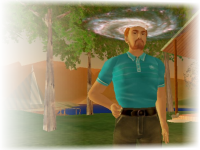Science Debate 2008
Sheril and Chris over at The Intersection, along with others, have been beating the drum for “ScienceDebate2008″ for some time now. The basic idea is that we should get the various Presidential candidates together and get them to explicitly address and debate science and science-policy issues. Lots and lots of bloggers have weighed in on this, so don’t expect me to link to them all; I’ll just arbitrarily pick out one post that I liked from Janet Stemwedel and link to that.
Here is my reason for thinking this is a good idea: to reduce the “blank slate” effect that allows people to make bad choices. Although there is this stereotype promulgated by many that scientists (at least of the academic sort) are all flaming liberals pre-biased against the Republicans, that’s not true. The fact is that scientists come from a wide variety of political backgrounds. With a caveat regarding the increasing prominence of creationism in our politics, and also caveats regarding the kinds of things Stephen Pinker wrote about in The Blank Slate, it’s possible to be an exceptional scientist while holding a wide diversity of political views. Mind you, most scientists will believe that any rational person will come to the same conclusion that they have, because scientists tend to be like that. (”I’m really smart, therefore anybody really smart will agree with me.”) But science doesn’t tell us the right division for market forces versus government intervention, it doesn’t tell us about the morality of wealth redistribution versus individual empowerment, etc.
However, the fact that politicians so rarely address science– other than spouting the usual rah-rah “we want to support innovation and high-tech jobs” kind of stuff in sound bytes– allows scientists to project whatever they want to see on the candidate they would choose for other reasons. Mind you, this transcends science. I remember in 2000 watching some people project potential anti-Microsoft-Monopoly potentials on Bush, which is of course a joke. I’ve also seen people project libertarianism on Nader. And so forth.
The fact that politicians so rarely address science allows scientists to vote for politicians who will be disasters for science without realizing what they’re doing. To my point of view, a science debate wouldn’t so much be an actual debate, where issues are hashed out, as a place where politicians were really forced to put enough of their cards on the table that it would be harder for us to kid ourselves in the way that we kidded ourselves in 2000. (Presumably scientists who voted for Bush didn’t believe he would be the disaster for science that he has turned out to be.) I like Janet’s ideas– let’s see who they ask, and what kind of things they say. Let’s find out who really understands something about science, and also understands that they don’t really understand science… and let’s find out where they’re going to be going to get scientific input– or, as in the case of Bush, “support”– for their policies.
There is, of course, one candidate who’s views on science are unambiguous. That would be Huckabee the Creationist, who has come forward with a clear declaration of ignoramusitude. Other than him, though, we may be kidding ourselves regarding Democrats and Republicans alike when we think that any given candidate whom we prefer for other reasons will be better than the mess we’ve got right now. Let’s try to get them talking about it as best possible. Even given the fact that debates are PR-soundbyte prepackaged shams, which soundbytes candidates choose will be useful information.
